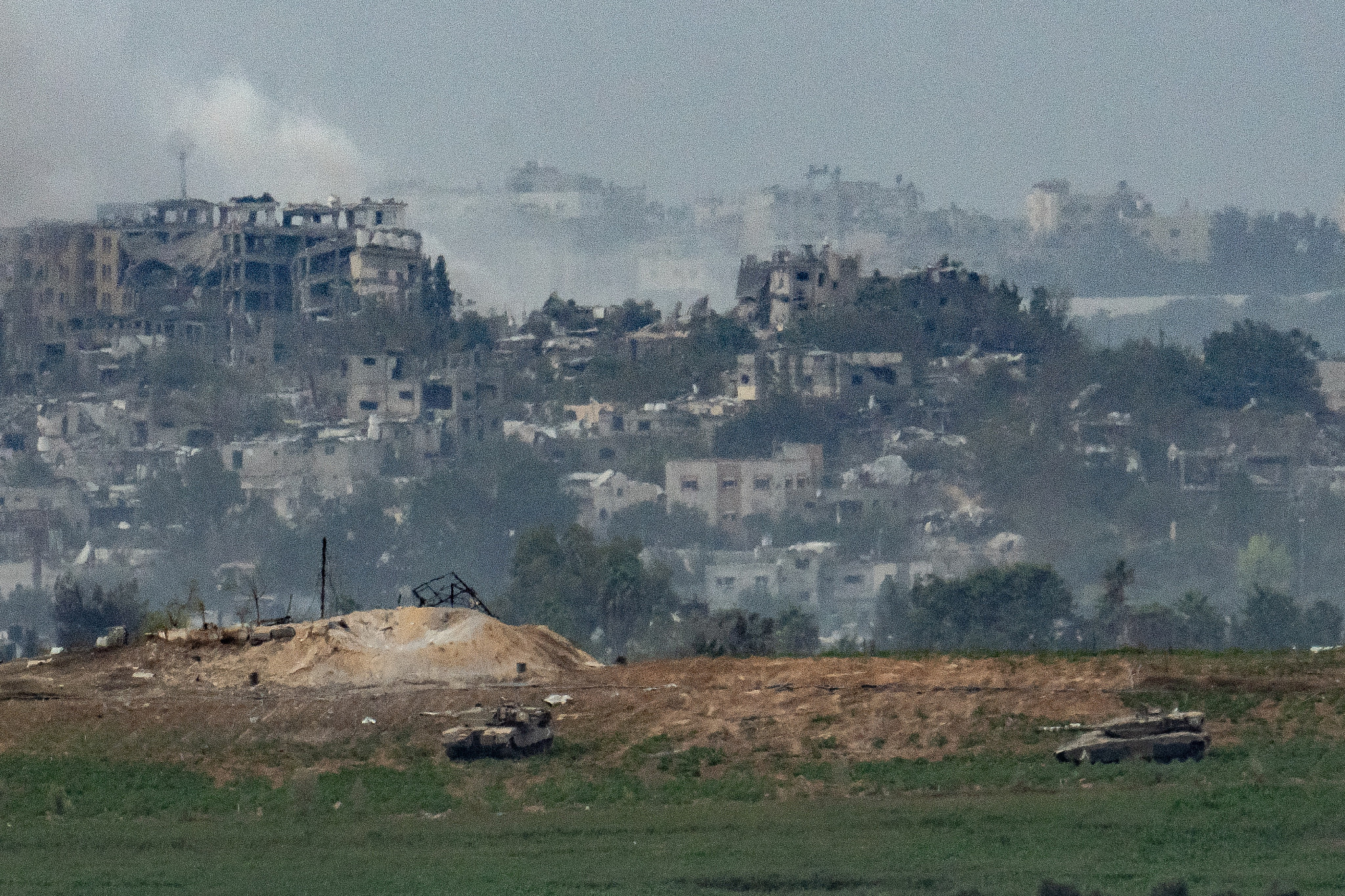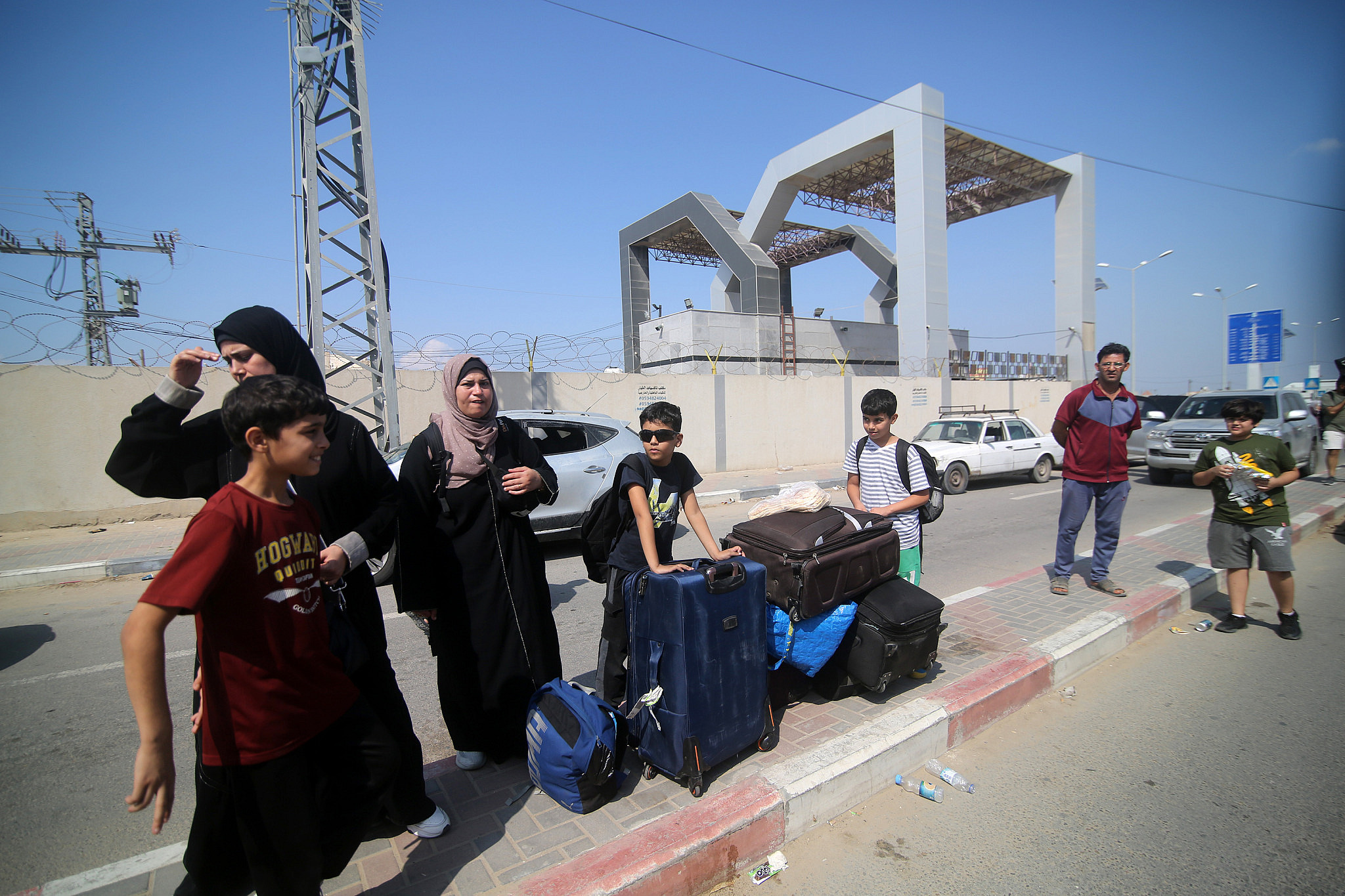An Intelligence Ministry document revealed by Local Call and +972 shows how the idea of population transfer to the Sinai is reaching official discussions.
Yuval Abraham, +972 Magazine, October 30, 2023

Palestinians inspect their home after an Israeli airstrike, in the city of Rafah in the southern Gaza Strip, October 29, 2023. (Abed Rahim Khatib/Flash90)
The Israeli Ministry of Intelligence is recommending the forcible and permanent transfer of the Gaza Strip’s 2.2 million Palestinian residents to Egypt’s Sinai Peninsula, according to an official document revealed in full for the first time by +972’s partner site Local Call yesterday.
The 10-page document, dated Oct. 13, 2023, bears the logo of the Intelligence Ministry — a small governmental body that produces policy research and shares its proposals with intelligence agencies, the army, and other ministries. It assesses three options regarding the future of the Palestinians in the Gaza Strip in the framework of the current war, and recommends a full population transfer as its preferred course of action. It also calls on Israel to enlist the international community in support of this endeavor. The document, whose authenticity was confirmed by the ministry, has been translated into English in full here on +972.
The existence of the document does not necessarily indicate that its recommendations are being considered by Israel’s defense establishment. Despite its name, the Intelligence Ministry is not directly responsible for any intelligence body, but rather independently prepares studies and policy papers that are distributed to the Israeli government and security agencies for review, but are not binding. The ministry’s annual budget is NIS 25 million and its influence is considered relatively small. It is currently headed by Gila Gamliel, a member of Prime Minister Benjamin Netanyahu’s Likud Party.
More
However, the fact that an Israeli government ministry has prepared such a detailed proposal amid a large-scale military offensive on the Gaza Strip, following Hamas’ deadly assault and massacres in southern Israeli communities on Oct. 7, reflects how the idea of forced population transfer is being raised to the level of official policy discussions. Fears of such plans — which would constitute a serious war crime under international law — have grown in recent weeks, especially after the Israeli army ordered about 1 million Palestinians to evacuate the northern Gaza Strip ahead of escalating bombardment and incremental ground incursions.
The document recommends that Israel act to “evacuate the civilian population to Sinai” during the war; establish tent cities and later more permanent cities in the northern Sinai that will absorb the expelled population; and then create “a sterile zone of several kilometers … within Egypt, and [prevent] the return of the population to activities/residences near the border with Israel.” At the same time, governments around the world, led by the United States, must be mobilized to implement the move.
A source in the Intelligence Ministry confirmed to Local Call/+972 that the document was authentic, that it was distributed to the defense establishment by the ministry’s policy division, and “was not supposed to reach the media.”
‘Make it clear there is no hope of returning’
The document unequivocally and explicitly recommends transferring Palestinian civilians from Gaza as the desired outcome of the war. The existence of the plan was first reported last week in the Israeli business newspaper Calcalist, and the full text of the document is published and translated here.
The transfer plan is divided into several stages. In the first stage, action must be taken so that the population of Gaza “evacuates south,” while the air strikes focus on the northern Gaza Strip. In the second stage, a ground incursion into Gaza will begin, leading to the occupation of the entire Strip from north to south, and the “cleansing of the underground bunkers of Hamas fighters.”
Concurrently with the re-occupation of Gaza, Palestinian civilians will be moved into Egyptian territory, and not be allowed to return. “It is important to leave the travel routes to the south open to enable the evacuation of the civilian population toward Rafah,” the document states.
According to an official in the Intelligence Ministry, the ministry’s personnel stand behind these recommendations. The source stressed that the ministry’s research is “not based on military intelligence” and serves only as a basis for discussions within the government.
The document proposes promoting a campaign targeting Palestinian civilians in Gaza that will “motivate them to accept this plan” and lead them to give up their land. “The messages should revolve around the loss of land, making it clear that there is no hope of returning to the territories Israel will soon occupy, whether or not that is true. The image needs to be, ‘Allah made sure you lose this land because of Hamas’ leadership — there is no choice but to move to another place with the assistance of your Muslim brothers,’” the document reads.
In addition, the document encourages the government to lead a public campaign in the Western world to promote the transfer plan “in a way that does not incite or vilify Israel.” This would be done by presenting the expulsion of Gaza’s population as a humanitarian necessity to win over international support, by arguing that relocation will lead to “fewer casualties among the civilian population compared to the expected casualties if the population remains.”
The document also says that the United States should be enlisted in the process to exert pressure on Egypt to absorb the Palestinian residents of Gaza, and that other European countries — particularly Greece and Spain — as well as Canada should help absorb and settle the Palestinian refugees. The Ministry of Intelligence said the document was not yet formally distributed to U.S. officials, but only to the Israeli government and security agencies.
A wider policy discussion
Last week, the Misgav Institute, a right-wing think tank headed by Meir Ben-Shabbat, a close associate of Prime Minister Netanyahu and a former head of Israel’s National Security Council, published a position paper that similarly called for the forced transfer of Gaza’s population to the Sinai. The institute recently deleted the post from Twitter and from its website after drawing strong international censure.
The deleted study was written by Amir Weitmann, a Likud activist and, according to sources familiar with him, a close associate of Intelligence Minister Gila Gamliel. Last week, on a Facebook page named “The Plan to Rehabilitate Gaza in Egypt,” Weitmann interviewed Likud MK Ariel Kallner, who told him that “the solution you propose, to move the population to Egypt, is a logical and necessary solution.”
This is not the only connection between the Likud, the Ministry of Intelligence, and the right-wing think tank. About a month ago, the Ministry of Intelligence pledged to transfer about NIS 1 million from its budget to the Misgav Institute to conduct research on Arab countries. If the Misgav Institute was somehow involved in drafting the ministry’s Gaza transfer recommendations, its logo, at least, does not appear on the document.
Sources in the Ministry of Intelligence said that the Gaza report was an independent study conducted by the ministry’s policy division, without the cooperation of an external party, but they did confirm that the ministry had recently begun working with the Misgav Institute, stressing that the government body works with various research groups with diverse political agendas. The Misgav Institute has not yet responded to queries for this article.
In addition, the Intelligence Ministry’s document was first leaked in a small internal WhatsApp group of right-wing activists who, together with Likud advocate Whiteman, promote the reestablishment of Israeli settlements in the Gaza Strip and the transfer of Palestinians living there.
According to one of these activists, the Intelligence Ministry document reached them through the mediation of a “Likud source,” and its public distribution is related to an attempt to find out whether “the Israeli public is ready to accept ideas of transfer from Gaza.”
The preferred option
The chances of fully implementing such a plan, which would amount to the total ethnic cleansing of the Gaza Strip, are negligible in many respects. Egyptian President Abdel Fattah el-Sisi has declared that he strongly opposes opening the Rafah Crossing to absorb the Palestinian population from Gaza. He argued that the displacement of Palestinians to the Sinai would threaten Israeli peace with Egypt, and warned that it would lead to Palestinians using Egyptian territory as a base to continue armed confrontations with Israel. A similar plan has been presented in the past by Israeli officials, and until now, it too had not matured into a serious policy discussion.
Moreover, after weeks of reports that the United States was attempting to raise the possibility of moving Palestinians to Egypt as part of a “humanitarian corridor,” U.S. President Joe Biden asserted yesterday that he and Sisi were committed to “ensuring that Palestinians in Gaza are not displaced to Egypt or any other nation.”
The Intelligence Ministry document states that Egypt will have an “obligation under international law to allow the passage of the population,” and that the United States can contribute to the process by “exerting pressure on Egypt, Turkey, Qatar, Saudi Arabia, and the UAE to contribute to the initiative, either with resources or with the absorption of displaced persons.” It also proposes conducting a dedicated public campaign aimed at the Arab world, with a “focus on the message of assisting the Palestinian brothers and rehabilitating them, even at the price of a tone that rebukes or even harms Israel.”
Finally, the document notes that the “large-scale migration” of non-combatants from combat zones is a “natural and sought-after outcome” that has also occurred in Syria, Afghanistan, and Ukraine, concluding that only the expulsion of the Palestinian population will constitute “an appropriate response [that] will enable the creation of significant deterrence in the entire region.”
The document presents two other options regarding what to do with the residents of Gaza the day after the war. The first is to allow the Palestinian Authority (PA), headed by the Fatah party in the occupied West Bank, to rule Gaza under Israeli auspices. The second is to cultivate another “local Arab authority” as an alternative to Hamas. Both options, the document claims, are undesirable for Israel from a strategic and security perspective, and will not provide a sufficient message of deterrence, especially to Hezbollah in Lebanon.
The authors of the study also noted that bringing the PA into Gaza was the most dangerous option of the three, because it could lead to the establishment of a Palestinian state. “The division between the Palestinian population in Judea and Samaria and Gaza is one of the main obstacles today preventing the establishment of a Palestinian state. It is inconceivable that the outcome of this attack [Hamas’ Oct. 7 massacres] will be an unprecedented victory for the Palestinian national movement and a path to the creation of a Palestinian state,” the document said.
The document further argues that a model of Israeli military rule and PA civilian rule, as exists in the West Bank, is likely to fail in Gaza. “There is no way to maintain an effective military occupation in Gaza only on the basis of military presence without [Israeli] settlements, and within a short time there will be internal Israeli and international pressure for withdrawal.”
The authors added that in such a situation, the State of Israel “will be considered a colonial power with an occupying army — similar to the current situation in Judea and Samaria, but even worse.” They noted that the PA has low legitimacy among the Palestinian public, and that based on Israel’s previous experience of handing over control of Gaza to the PA and Hamas’ eventual takeover, Israel should not “repeat the same mistake that led to the current situation.”
The other option, the formation of a local Arab leadership to replace Hamas, is undesirable according to the document, because there are no local opposition movements to Hamas and a new leadership is liable to be more radical. “The most plausible scenario is … not an ideological shift but rather the emergence of new, possibly even more extreme, Islamist movements,” it said. The authors mention the necessity of “creating ideological change” in the Palestinian population through a process of what it likens to “de-Nazification,” requiring Israel to “dictate the school curricula and enforce its use for an entire generation.”
Finally, the document argued that if Gaza’s population remained in the strip, there would be “many Arab casualties” during the anticipated re-occupation of the territory, which would damage Israel’s international image even more than expelling the population. For all these reasons, the Ministry of Intelligence’s recommendation is to promote the permanent transfer of all Palestinian civilians from Gaza to the Sinai.
The Defense Ministry, the army spokesperson’s office, and the Misgav Institute did not yet respond to +972’s requests for comment by the time of this article’s publication. Any responses received will be added here.
A version of this article was first published in Hebrew on Local Call. Read it here.




Leave a Reply